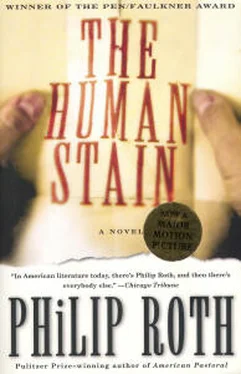Yet he couldn't tell her he was colored. The words he heard himself having to speak were going to make everything sound worse than it was — make him sound worse than he was. And if he then left it to her to imagine his family, she was going to picture people wholly unlike what they were. Because she knew no Negroes, she would imagine the kind of Negroes she saw in the movies or knew from the radio or heard about in jokes. He realized by now that she was not prejudiced and that if only she were to meet Ernestine and Walt and his mother, she would recognize right off how conventional they were and how much they happened to have in common with the tiresome respectability she had herself been all too glad to leave behind in Fergus Falls. “Don't get me wrong — it's a lovely city,” she hastened to tell him, “it's a beautiful city. It's unusual, Fergus Falls, because it has the Otter Tail Lake just to the east, and not far from our house it has the Otter Tail River. And it's, I suppose, a little more sophisticated than other towns out there that size, because it's just south and to the east of Fargo-Moorhead, which is the college town in that section of the country.” Her father owned a hardware supply store and a small lumberyard. “An irrepressible, gigantic, amazing person, my father. Huge. Like a slab of ham. He drinks in one night an entire container of whatever alcohol you have around. I could never believe it. I still can't. He just keeps going. He gets a big gash in his calf muscle wrestling with a piece of machinery — he just leaves it there, he doesn't wash it. They tend to be like this, the Icelanders. Bulldozer types. What's interesting is his personality. Most astonishing person. My father in a conversation takes over the whole room. And he's not the only one. My Palsson grandparents, too. His father is that way. His mother is that way.” “Icelanders. I didn't even know you call them Icelanders. I didn't even know they were here. I don't know anything about Icelanders at all. When,” Coleman asked, “did they come to Minnesota?” She shrugged and laughed. “Good question. I'm going to say after the dinosaurs. That's what it seems like.” “And it's him you're escaping?” “I guess. Hard to be the daughter of that sort of feistiness. He kind of submerges you.” “And your mother? He submerges her?” “That's the Danish side of the family. That's the Rasmussens. No, she's unsubmergeable. My mother's too practical to be submerged. The characteristics of her family — and I don't think it's peculiar to that family, I think Danes are this way, and they're not too different from Norwegians in this way either — they're interested in objects. Objects. Tablecloths. Dishes. Vases. They talk endlessly about how much each object costs. My mother's father is like this too, my grandfather Rasmussen. Her whole family. They don't have any dreams in them. They don't have any unreality. Everything is made up of objects and what they cost and how much you can get them for. She goes into people's houses and examines all the objects and knows where they got half of them and tells them where they could have got them for less. And clothing. Each object of clothing. Same thing. Practicality. A bare-boned practicality about the whole bunch of them. Thrifty. Extremely thrifty. Clean. Extremely clean. She'll notice, when I come home from school, if I have one bit of ink under one fingernail from filling a fountain pen. When she's having guests on a Saturday evening, she sets the table Friday night at about five o'clock. It's there, every glass, every piece of silver. And then she throws a light gossamer thing over it so it won't get dust specks on it. Everything organized perfectly. And a fantastically good cook if you don't like any spices or salt or pepper. Or taste of any kind. So that's my parents. I can't get to the bottom with her particularly. On anything. It's all surface. She's organizing everything and my father's disorganizing everything, and so I got to be eighteen and graduated high school and came here. Since if I'd gone up to Moorhead or North Dakota State, I'd still have to be living at home, I said the heck with college and came to New York. And so here I am. Steena.”
That's how she explained who she was and where she came from and why she'd left. For him it was not going to be so simple. Afterward, he told himself. Afterward — that's when he could make his explanations and ask her to understand how he could not allow his prospects to be unjustly limited by so arbitrary a designation as race. If she was calm enough to hear him out, he was sure he could make her see why he had chosen to take the future into his own hands rather than to leave it to an unenlightened society to determine his fate — a society in which, more than eighty years after the Emancipation Proclamation, bigots happened to play too large a role to suit him. He would get her to see that far from there being anything wrong with his decision to identify himself as white, it was the most natural thing for someone with his outlook and temperament and skin color to have done. All he'd ever wanted, from earliest childhood on, was to be free: not black, not even white — just on his own and free. He meant to insult no one by his choice, nor was he trying to imitate anyone whom he took to be his superior, nor was he staging some sort of protest against his race or hers. He recognized that to conventional people for whom everything was ready-made and rigidly unalterable what he was doing would never look correct. But to dare to be nothing more than correct had never been his aim. The objective was for his fate to be determined not by the ignorant, hate-filled intentions of a hostile world but, to whatever degree humanly possible, by his own resolve. Why accept a life on any other terms?
This is what he would tell her. And wouldn't it all strike her as nonsense, like one big sales pitch of a pretentious lie? Unless she had first met his family — confronted head-on the fact that he was as much a Negro as they were, and that they were as unlike what she might imagine Negroes to be as he was — these words or any others would seem to her only another form of concealment. Until she sat down to dinner with Ernestine, Walt, and his mother, and they all took a turn over the course of a day at swapping reassuring banalities, whatever explanation he presented to her would sound like so much preening, self-glorifying, self-justifying baloney, high-flown, highfalutin talk whose falseness would shame him in her eyes no less than in his own. No, he couldn't speak this shit either. It was beneath him. If he wanted this girl for good, then it was boldness that was required now and not an elocutionary snow job, a la Clarence Silk.
In the week before the visit, though he didn't prepare anyone else, he readied himself in the same concentrated way he used to prepare mentally for a fight, and when they stepped off the train at the Brick Church Station that Sunday, he even summoned up the phrases that he always chanted semi-mystically in the seconds before the bell sounded: “The task, nothing but the task. At one with the task. Nothing else allowed in.” Only then, at the bell, breaking from his corner — or here, starting up the porch stairs to the front door — did he add the ordinary Joe's call to arms: “Go to work.”
The Silks had been in their one-family house since 1925, the year before Coleman was born. When they got there, the rest of the street was white, and the small frame house was sold to them by a couple who were mad at the people next door and so were determined to sell it to colored to spite them. But no one in the private houses ran because they'd moved in, and even if the Silks never socialized with their neighbors, everyone was agreeable on that stretch of street leading up toward the Episcopal rectory and church. Agreeable even though the rector, when he arrived some years earlier, had looked around, seen a fair number of Bajians and Barbadians, who were Church of England — many of them domestics working for East Orange's white rich, many of them island people who knew their place and sat at the back and thought they were accepted — leaned on his pulpit, and, before beginning the sermon on his first Sunday, said, “I see we have some colored families here. We'll have to do something about that.” After consulting with the seminary in New York, he had seen to it that various services and Sunday schools for the colored were conducted, outside basic church law, in the colored families' houses. Later, the swimming pool at the high school was shut down by the school superintendent so that the white kids wouldn't have to swim with the colored kids. A big swimming pool, used for swimming classes and a swimming team, a part of the physical education program for years, but since there were objections from some of the white kids' parents who were employers of the black kids' parents — the ones working as maids and housemen and chauffeurs and gardeners and yardmen — the pool was drained and covered over.
Читать дальше












